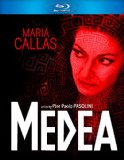| Reviews & Columns |
|
Reviews DVD TV on DVD Blu-ray 4K UHD International DVDs In Theaters Reviews by Studio Video Games Features Collector Series DVDs Easter Egg Database Interviews DVD Talk Radio Feature Articles Columns Anime Talk DVD Savant Horror DVDs The M.O.D. Squad Art House HD Talk Silent DVD
|
DVD Talk Forum |
|
|
| Resources |
|
DVD Price Search Customer Service #'s RCE Info Links |
|
Columns
|
|
|
Medea
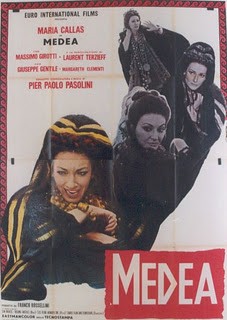
The great Italian poet, filmmaker, and provocateur extraordinaire Pier Paolo Pasolini, who once famously embraced (apparent) contradiction by publicly declaring, "I am a Catholic. I am a Communist. I am a homosexual," made no less seemingly contradictory choices when it came to translating literary texts into cinema. His notorious final work, Salo, was his rendition of de Sade, but he had previously put his stamp on St. Matthew, Chaucer, and Boccaccio while bringing them to the silver screen, so an adaptation of Medea, the myth cemented for the ages by Euripides in 431 BC, was hardly out of character, and Pasolini presented his take on the ancient text in 1969 with the tempestuous opera diva Maria Callas as the character--the eternal symbol of "hell hath no fury like a woman scorned"--from which the play derives its name. If Pasolini reworks Euripides's version in some ways to a point beyond recognition, his aim is to convey the essential, shattering, inconsolable anguish of the story, and the slightly uneven but fascinatingly unique result of the experiment makes clear how rich and ripe the material was for mining by Pasolini's febrile, probing sensibility.
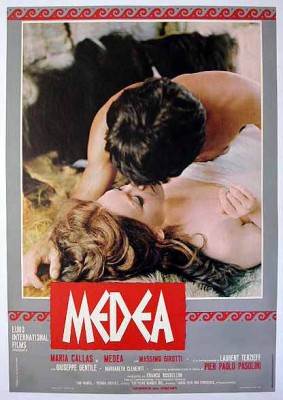
The Euripides telling of Medea is certainly here, but Pasolini has recontextualized it, eliminating the copious monologues and chorus of the play for a much more visual, visceral, often wordless experience; he starts long before the play's primary events (which, even then, are mostly verbally described) by showing us the origin of Medea's husband, Jason (of the Argonauts fame), whose mother sent him away from Greece to be raised and educated by a centaur in the wilder world outside, and of Medea herself. She is a queen in a land of "barbarians" that worshiped the totemic Golden Fleece, but when Jason arrives to make off with the sacred relic and take it back with him for a triumphant re-entry into Corinth and Greek society, he captures at the same time Medea's erotic and romantic affections, which cause her to abandon her home and status, along with her lifelong worldview and belief system, for the more "modern" budding civilization of Greece, whose particular gods, rituals, and hierarchy are incomprehensible to her, and where she is demonized and ostracized as a sorceress who comes from frighteningly dark, primitive places. She is ultimately betrayed by the polygamous Jason, who, the Golden Fleece having failed to land him the throne as intended, integrates himself into the Corinthian aristocracy by marrying a princess, leaving Medea and their children to be exiled into eternal, homeless, impoverished wandering by the king, who (rightly) mistrusts Medea's inevitable jealousy and her aura of primal unreason.
Medea's fury at being thrown over, her and her children's lives cruelly cast to the winds of fate by her husband's calculated, "rational" decision and his infuriating admonishments to be reasonable, leads up to the definitive climax: Medea kills the children and is taken back to the murky supernaturalism from whence she came to haunt the "modern" world with its repressed, violent, primitive past; her specter laughs at Jason from above as he begs in vain to be allowed access to his dead children's bodies for the proper mourning and burial that Medea is gleefully, vengefully set on denying him. (Pasolini depicts this ascension more concretely, in a blistering final sequence wherein Medea has set fire to the palace containing the young corpses and sardonically mocks Jason's pleading from the rooftop, her twisted, wild-eyed visage viewed by the camera through a visually and thematically perfect, uncrossable screen of scorching flame.)
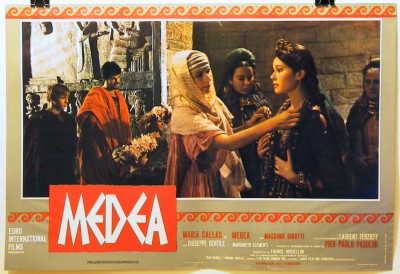
Pasolini's emphasis is on the painful splitting away of Jason and, especially, Medea from their superstitious, barbaric, yet unified and whole origins to a state of uprooted conflict, ambivalence, and alienation as they struggle to merge themselves with the civilized ideals and aspirations of a forward-looking, necessarily past-denying society in the making--a difficult fit that's especially wrenching for Medea when Jason is able to assimilate himself away from her and their children and toward the values and hierarchy of the Corinthians. This nomadic splintering of identity--an unsettled tension between "primitive" and "modern," between nature and civilization--that goes on around and within Medea is aptly conveyed through both Maria Callas's stately, very regal presence (which reminds one that the word "icon," so often used in conjunction with her name, has an etymology and connotations that and make her casting seem almost intuitive) and Pasolini's style itself, a combination of his more naturalistic Neorealist roots (e.g., Mamma Roma) and the increasing restless formalism of his later aesthetic, which here leads to a handheld, immediate shaky dynamic sitting incongruously alongside breathtakingly expansive, precisely composed, imposingly static-feeling tableaux that could be straight out of 2001.
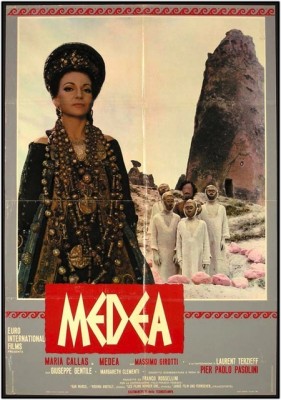
It's a bold, discombobulating approach familiar from an effort that shortly preceded it in Pasolini's oeuvre, 1968's contemporary drama-cum-myth Teorema, for which it worked perfectly; that film is one of Pasolini's greatest, perhaps his masterpiece. The effectiveness of that same style in Medea is a bit more subdued and intermittent, possibly because of the familiarity of the story being told, which is so entrenched that all Pasolini's valiant--and often successfully startling--efforts at defamiliarizing it can't quite root it out (although the most inventively disorienting of these--a doubling-up of Medea's revenge on Jason's new wife in which two slightly different versions play out in succession--is in itself virtuoso enough to make the film well worthwhile.) Medea is in the end something lesser than Teorema, more of a fascinating experiment than a wholly achieved work of art, a film that is worthy but minor in the context of Pasolini's body of work. Even with that qualification, however, its newfound availability on Blu-ray is certainly a gift to classicists and cinephiles alike; it's the kind of film whose lack of prominence in most surveys and retrospective discussions of its maker's career can make it feel like an unfairly overlooked discovery long overdue for unearthing and reexamination, even if it's neither the most exemplary of his works nor the best introduction to them.
THE BLU-RAY DISC:
The AVC/MPEG-4, 1080/24p transfer, at the theatrical aspect ratio of 1.85:1, is beautiful, conveying in minutely restored detail Pasolini's, cinematographer Ennio Guarnieri's, and renowned production designer Dante Ferretti's (who later designed Salo and numerous Scorsese pictures beginning with The Age of Innocence) primary-colored vision of Medea's personages amid a stark, vast natural world. There is no flicker or compression artifacting to speak of, and any tiny visual flaws (some debris around the edges) seems clearly to be innate in the source materials used. This is an all-around fantastic visual presentation that takes full advantage of the clean-up opportunities afforded by digital technology without removing too much of the cinematic experience's glow or texture.
Sound:The Dolby Digital 2.0 stereo soundtrack, apart from a couple of minutes or so of popping noise at regular intervals in the very last reel (and, as always for Italian films made before the mid to late '70s, a noticeable dubbing of all sound because of the Italian film industry's avoidance of synchronized sound until the later '70s), is very nice, coming through clearly and fully, certainly on par with (and most likely quite a bit superior to) what any print of the film would sound like at a repertory cinema.
Extras:--Tony Palmer's Film About Callas, a 90-minute 1977 documentary on the life of the legendary diva. Director Tony Palmer collects archival performance and interview footage and intercuts it with (then) contemporary commentary by opera experts and Callas intimates to create a fairly candid portrait of a woman--the "frumpy" daughter of poor Greek immigrants--who transformed herself into a conduit of the highest passions and who, even after her death, continues to set the world alight with her passion and unique ferocity. (Her influence extends so far that Patti Smith was paying obeisance during Callas's lifetime, and PJ Harvey has been called "the Maria Callas of rock.") This film is only very loosely related to the main feature, but it is nevertheless a generous bonus feature that makes for an informative and engaging viewing experience all its own.
--The film's original theatrical trailer is something, too, a fittingly Pop-arty, jaggedly edited little creation whose graphic qualities bring to mind nothing so much as a sort of movie poster come to life.
FINAL THOUGHTS:Pasolini's Medea is a bold exercise in contradiction and contrast in which, for neither the first nor the last time, the (in)famous cinéaste investigates what sparks of rejuvenated relevance he can elicit by rubbing a centuries-old text against his modern, radical sensibility. Those sparks don't come as fast or furious as they do in his indelible Salo, but they're definitely there in amounts generous enough to warrant seeking it out for a close look. It may not be entirely cohesive as either a retelling or a subversion, but perhaps some incohesiveness is part of the point. In any case, even in the face of its overall indecisiveness, there are enough moments of cinematic ingenuity in this Medea to inflame the senses and jar the intellect that it becomes an experience somehow at once earthy and hallucinatory--which is, after all, a tone convincingly true and appropriate to the immutably tragic spirit of its source. Recommended.
|
| Popular Reviews |
| Sponsored Links |
|
|
| Sponsored Links |
|
|
| Release List | Reviews | Shop | Newsletter | Forum | DVD Giveaways | Blu-Ray | Advertise |
|
Copyright 2024 DVDTalk.com All Rights Reserved. Legal Info, Privacy Policy, Terms of Use,
Manage Preferences,
Your Privacy Choices | |||||||









